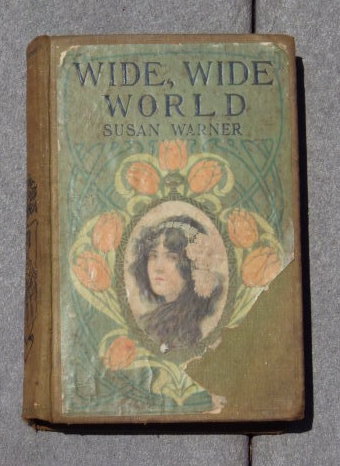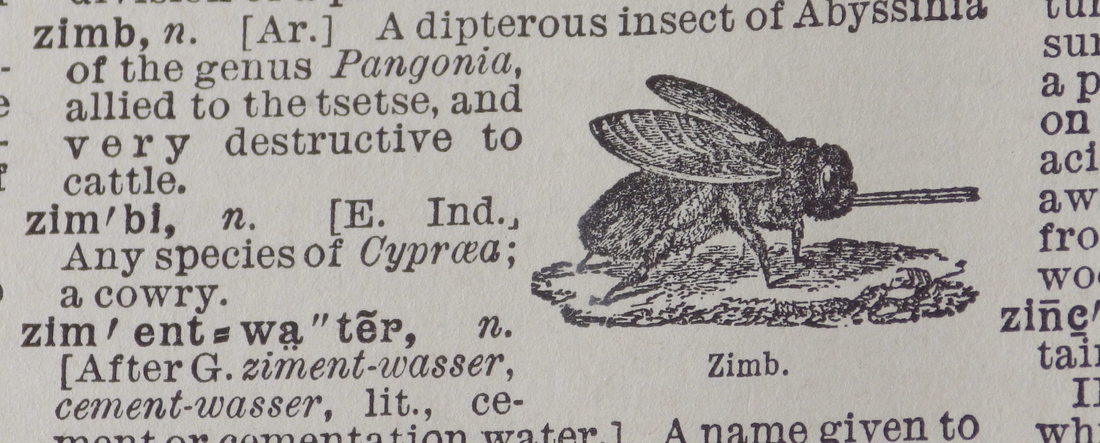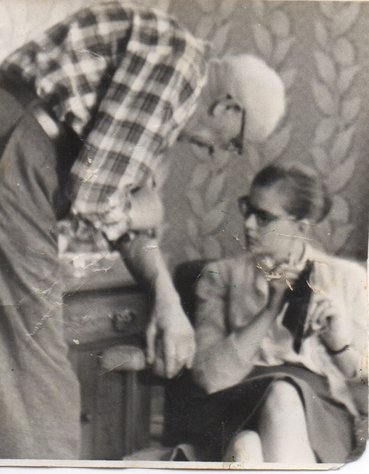|
One of my favorite nephews was helping me shuffle boxes of stuff from one place to the other recently. With that mix of patience and impatience native to the under-20 crowd, he did not express the slightest flicker of curiosity. Still, his doubtful expression as he slid the carton (Marked "A-16") into the back of the Honda made me want to explain a little. "I haven't unpacked that box since before your Uncle Jeff and I got married," I ventured. Which would make it the equivalent to the Jazz Age to him. "Toss it!" he said, then, reluctantly, "Why?" "Because there was space?" I said. "Because I never got around to it?" "Huh," he said. "Welp, that's the last of the pile. Anything else?" There wasn't, except my continuing impulse to explain. And of course my own curiosity. I hadn't unpacked the box -- or possibly even peeked into it –– for a very long time. Under a layer of yellowed St. Petersburg Times packing paper, an old acquaintance gazed back at me. Wide Wide World was the first real bestseller in the U.S. Published in 1850, it sold hundreds of thousands of copies. And then, for a couple of solid reasons, it disappeared from most people's memories. Why was it forgotten? Here's the short list: 1) It's a "woman's" book, which critics and scholars later tended to dismiss. What's a "woman's book"? Well, the short form is that, like Elizabeth Gaskell's Cranford novels, The Wide Wide World is focused on a heroine within the limited sphere of house and hold. 2) Like Little Dorritt or The Shack, the book offers a lot of weeping. Sentimentality is all well and good, but like unhappy families, I think every generation needs its own sentimental novel. Bridges of Madison County, anyone? Jonathan Livingston Seagull? It's almost as if the reading public wrings the emotion out of a popular book, leaving a dry husk for the next wave of readers. Or not. It's just a theory.
So it's not a book that is going to have a revival, like Beryl Markham's West with the Night*. It's not a book I'm going to read again, ever. But I don't want to forget it. And so it has waited in a cardboard box lo these many years. Wide Wide World essentially fired up the country's book publishing industry. The novel was huge. It outsold David Copperfield in England. But Susan Warner did NOT make a fortune from it. She and her sister started writing after their father lost all the family money in the panic of 1837. The girls were poor and writing was their best option to keep body and soul together. They managed, but they did not enjoy the life of bestselling authors. Susan went on to publish a book a year until her death at age 66. The Warner sisters have been mostly forgotten. Mostly: they did manage to pass along their family property, Constitution Island, to the US Military Academy at West Point. The island is part of the campus, although their house (Warner House, natch) is presently in a state of disrepair. Sic transit gloria mundi. Resources:
*A quick essay about West with the Night. What Katy Read: Feminst re-readings of "classic" stories for girls, by Shirley Foster and Judy Simons, University of Iowa Press, 1995. Child brides in present-day US Goodreads page for Wide Wide World https://www.enotes.com/topics/wide-wide-world-susan-warner "Loving The Wide Wide World: a novel, its fans, and their fictions" essay by Jennifer L. Brady, Harvard. Margaret Atwood on "Women's Novels." http://www.inspirationalarchive.com/1730/the-history-of-jesus-loves-me-this-i-know-song/ Visible Women: New Essays on American Activism, edited by Nancy A. Hewitt, Susanne Lebsock. University of Illinois Press, 1993. Nineteenth-Century American Women's Novels: Interpretative Strategies by Susan K. Harris, Cambridge University Press, 1990 "Panics, Gifts, and Faith in Susan Warner's Wide Wide World" in From Gift to Commodity: Capitalism and Sacrifice in Nineteenth-century American Fiction, by Hildegard Hoeller, University of New Hampshire Press, 2012. Susan Warner and "The Wide Wide World" by Mabel F. Sltstetter, The Elementary English Review, Vol 14, No 5 (MAY 1937), pp115-167.
4 Comments
The oddest images prompt stories. My writing friend Kate Raynes has the knack for locating just the right picture to springboard her fiction into the stratosphere. Or maybe it's the knack for writing unsettling stories related to those offbeat images. Go read some of her stories (don't overdose!) and tell me –– chicken or egg? I like a photo for warming up or for simple fun. Today the personal-care products seemed to be staging a drama just for me. Story 1 –– Charged
They were both ambushed by the amorous impulse. It hit them as if their batteries had been given a big zap of power. It was maybe too much juice. They both suspected as much, but what kind of fool turns a back on the chance at big love? When they could reach one another, they necked like kids. Their kisses were all the sweeter for the hard job they worked, because who knew when they'd be spent? All their vim washed down the drain. It would be over too soon any way they looked at it, but they would make the most of their time. Story 2 –– Like Lizards The electric toothbrushes were at it again, she thought, must be the season. Pairs of lizards would be intertwined on the back patio, and snarls of snakes could be expected under the old apple-tree. The sukebind would be blooming, and the good lord alone knew what would happen after that. Story 3 –– Evidence It wasn't healthful, but she seemed to be unable to stop herself from using the key she'd gotten from him those months ago. She turned the well-oiled bolt, opened the door, and there she would be again, walking through his apartment. It happened more often than she liked to admit to herself. It didn't make her feel good. His refrigerator always looked lonesome to her: not enough ingredients for a meal, leftover take-out cartons forming an archeological record of past dinners. The apartment seemed to lack something domestic. He wasn't a dirty housekeeper. He never left laundry piled up; he was as neat as a cat with his clothes. But still. Not as if they had lived there together, she sometimes reminded herself. She'd spent a few nights in a row from time to time, especially when they had been working on the Chapparel project, but she'd never gotten, for instance, her own drawer. The top drawer of his dresser, she noted dully, was still harboring an innocent tumble of silky underthings from his new girlfriend. Or not, she thought with a moment of clarifying spite. Maybe it was him dressing up. She used a pencil to lift a pair of lacy somethings out of the drawer. No such luck. They'd never fit him. She had to stop doing this. Imagine getting caught. Caught looking at someone else's underpants. Even knowing he was out of town for at least the week, she felt shame wash over her. She never took anything, never stole a single hair from his comb for a love-spell, or sniffed the dent in his pillow case for the hint of his unforgotten scent. Or for hers. He was not my favorite Bond, but he was a smooth Saint. And he was a pop culture icon; Amy Winehouse didn't have to explain anything past "like Roger Moore," because we got it. I'll skip the Nerf Herder song and also close my eyes against Roger Moore's own song stylings. Goodbye, Mr. Moore. Weird, cool, and oddly entertaining: How and why? Who would do such a thing? I can only answer for why I found and listened to this Craftsman music as I was in quest of power-tool Christmas music, which I remembered from a long-ago NPR story about the things people play at the holidays. The album (A Toolbox Christmas, natch) scores high in the category of odd, though not so well in the "listenability" department. Well, kudos* to anyone who makes music.
*Word nerd alert: "kudos" is a singular noun that translates from the Greek as "praise." So in a grammatically correct universe, when someone is highly praised, she gets much kudos rather than many kudos. When asked, many of the manly American men writers of their day used to claim that writing is easy. You just open a vein. (Versions of the quote come from sportswriter Red Smith, sportswriter and novelist Paul Gallico, wordy novelist Thomas Wolfe, and his High-T Manliness Himself –– Ernest Hemingway. Thanks Garson O'Toole for this blog all about it.) Um, okay, boys. Not for nothing, but bleeding is a lot easier.
Which opens the door to the real the question: why write at all. Why not just not write? Get the other things on my list done. Retire or whatnot.
I would, actually, if I could. So far I have failed to give it up. I've alluded to The Rime of the Ancient Mariner a time or two; it's that poem with the old guy pestering people at a wedding, insisting that he tell them HIS story –– that's a pretty good illustration of what goes on over here. And yet, despite characters shouting and raising their hands frantically in the back of my skull-duggery room and a good playlist cued up, I am dipping into Reynold Price's wonderful Learning a Trade: A Craftsman's Notebooks 1955-1997. It's an annotated journal that gives me hope: in it, Price writes about his process. He dithers and wonders about his characters' motivations and choices. He revisits and re-considers his own moral position based on the things his characters do –– or what they must do, whether he wants them to do or not. Price was a young man at start of these notebooks studying and writing in Oxford and then back in North Carolina, before he wrote A Long and Happy Life, his first novel. By the end, he's had a has successful career, including Kate Vaiden, and a dozen other novels, as well as screenplays and short stories, books with a biblical bent, and volumes of memoir. Here's a sample from page 77 of Learning a Trade. 20 January 1957 LONDON But look, isn't this story in danger of ending with a kind of cheat, that is with no resolution? What is the end going to imply?: simply that she leaves home for Norfolk or wherever? Maybe Wesley had better make some kind of gesture, however small. And page 129: 27 August 1960, DURHAM Rosacoke has told Wesley her pregnancy. His only reaction has been silence –– then question: has she known anyone else? Then simply telling her to come on, they must practice. Her own feeling through the revelation is chiefly numbness, tiredness –– though Wesley notices on her face the same look that was there on the November night (which was described then as hate). I haven't read the story in question, and may never do so. Can't say I am want to know about Wesley and Rosacoke. What's interesting –– and heartening –– is that Price clearly spent a good portion of his waking life playing with his paper dolls, too, imagining an inner life for these imaginary friends, worrying about their actions and what it all means. Misery is not the only thing that loves company. Ah burdocks. I wrote about these plants before; we are still waging war on them at the Would-Be Farm. In springtime, they are among the first plants to push green leaves out of the ground. They are unmistakable, lush and green. They grow everywhere, including in a ring around the area where we burn them in the autumn. This spring, I harvested a few. And by "harvest" I mean "dig up, kill, and eat without prejudice." Burdock is widely used in Japanese cuisine. I didn't have sake, soy, or much else, so I cooked it as I might have done with a carrot or some lotus root. I put them into a bucket of water and then first scrubbed the clay dirt from the roots before peeling them like carrots. I sliced the roots into slivers, and sauted them with apple slices and maple syrup. It was a little tough, a little subtle, and It didn't make our top ten list of exotic delicious items from the farm (Pureed hickory-nut frozen dessert, anyone? Maple syrup perchance? How about apple-wood smoked fish? Or milkweed greens? Or wild free-range turkey? Ahhhh.), but Mr. Linton allowed that –– all things considered –– we wouldn't starve if we were left with only burdocks to sustain us. Happily, there are other crops on hand. We had our first mushroom from last year's plantings. The single mushroom –– shitake –– was delicious, even to me, and I do not like mushrooms as a rule. And <insert sound of heavenly choir> the asparagus yielded a sampler this spring. Other good news from the Farm: several of the plants that looked dead at the end of last summer's drought have returned from Underworld. The spirit of Spring springs eternal.
The hell with arachnophobia and germophobia, astraphobia and xenophobia, claustrophobia and thanatophobia. Thanks to The Useless Information Society, I give you what can best be described as piffle. Phobatrivaphobia is the fear of trivia about phobias.
It took two and a half years of procrastination and one short day of work to get solar power at the Would-Be Farm. Some readers may remember our solar ambitions and my brief return to calculus. What I neglected to mention is that I didn't finish that class. Stupidly enough, I lost my notes from class while transporting myself and the late small dog across the Philadelphia International Airport. I know: duh. Anyhow, the notebook contained my calculations for the first weeks of class as well as the splattered remains of those four brave brave brain-cells that had remembered something about calculus. I honestly couldn't face doing that homework over again. Never mind the work for the rest of the semester. I was raised to look for solutions in the pages of a book. Thank you, O Beloved Bookworm! So, to book! The class in solar system design was actually a bit of overkill. I just wanted to set up a couple of batteries and some panels so that we could have light and be able to re-charge our electronics. (Oh, which reminds me of this potty-mouthed and funny political Tweet. ) The go-to-solution book this time was Stand-Alone Solar Energy by Oliver Style, a clearly-written, solution-oriented reference that focused on installing systems in remote, underdeveloped areas with ITACA and Concern America.
So, two panels, a controller mounted on the side of Base Camp, two batteries, an inverter, and poof: we have power for the water pump, lights, various small electronics, and we can charge battery packs for our power-tools. Utility! Civilization! No unsightly power-lines and no monthly bill. |
About the Blog
A lot of ground gets covered on this blog -- from sailboat racing to book suggestions to plain old piffle. FollowTrying to keep track? Follow me on Facebook or Twitter or if you use an aggregator, click the RSS option below.
Old school? Sign up for the newsletter and I'll shoot you a short e-mail when there's something new.
Archives
June 2024
Categories
All
|






 RSS Feed
RSS Feed
